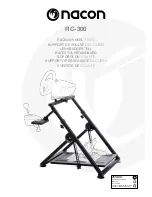
RECREATIONAL VEHICLE (RV)
Battery Carbon Monoxide Alarm
USER’S MANUAL
SA-339 Non-Replaceable Lithium Battery
ALL RIGHTS RESERVED
SA33910012018-1
ATTENTION:
This user’s manual contains important Carbon
Monoxide (CO) alarm installation, operation, troubleshooting and
warranty information. Read, follow, and keep this manual for future
reference.
NOTE: If you install or purchase this alarm for another person, give
this manual to that person.
IMPORTANT: It is recommended that this alarm is replaced after
five years of service. Record the installation / retail sale date in the
Owner’s Replacement Record section of this manual and also record
a replacement date. This unit has an End of Life (EOL) signal that
will sound after 5 years of use.
WHY EVERY RV NEEDS A SA-339 CO ALARM
Everyone is at risk for carbon monoxide poisoning! Particularly sensitive are
children, pregnant women, the elderly and people with lung or heart disease or
anemia! Carbon monoxide (CO) is an odorless, colorless gas that prevents the
blood from carrying oxygen to vital organs.
CO is 200 times more likely to
replace oxygen in the blood. The Consumer Product Safety Commission
(CPSC) recommends using at least one CO alarm located outside of
sleeping areas. For the best security, locate a CO alarm in each sleeping
area. Safe-T-Alert CO alarms are available for secondary installations.
ABOUT THIS ALARM
Because CO is a colorless, odorless, tasteless and highly poisonous gas; it
can endanger lives even at low levels of concentration. The CO Alarm
will alert you to potentially dangerous situations.
The following
symptoms may be related to CO POISONING. Discuss these
symptoms with ALL household members and RV guests:
Mild Exposure
: Headaches, running nose, sore or watery eyes, often
described as “flu-like” symptoms.
Medium Exposure:
Dizziness, drowsiness, vomiting.
Extreme Exposure:
Unconsciousness, brain damage and death.
NOTE:
Reported cases of CO gas poisoning indicate that while
victims are aware they are not well, they are disoriented. They are
unable to save themselves by exiting the RV or calling for
assistance
. Small children and pets may be affected first.
Your SAFE-T-ALERT
TM
SA-339 alarm helps protect your
household members and guests from CO produced while using
your RV. CO gas is produced when any type of fuel is
incompletely burned. Potential sources of CO in and around your
RV can include gas or diesel engine exhaust, portable space
heaters, gas stoves and ovens, furnaces, defective engine exhaust
systems, portable grills, other nearby RVs, portable generators,
generator exhaust, and other propane-powered appliances. All are
sources of CO.
The following are also sources of CO that may affect your RV
:
Extended operation of unvented fuel burning appliances can
build up high CO levels.
An idling vehicle in an open or closed garage.
Temperature inversions can trap exhaust near the ground.
CO build up can be caused by reverse/negative venting of fuel
burning appliances including; 1) Clogged, loose or faulty stacks
or chimneys of (clothes dryers, furnaces and water heaters,
etc.), 2) wind direction and/or velocity, 3) simultaneous
operation of multiple fuel burning appliances, and/or exhaust
fans.
!
WARNING:
LIMITATIONS OF CO ALARMS
THIS ALARM WILL NOT WORK WITHOUT POWER.
DO NOT REMOVE THE 3 VOLT LITHIUM BATTERY
THIS ALARM WILL ONLY INDICATE THE PRESENCE OF
GAS AT THE SENSOR.
CO may be present in other areas.
MTI
recommends installing CO alarms in all sleeping areas.
Do not
block or cover
the alarm with any object that can prevent carbon
monoxide from reaching the sensor.
THIS ALARM IS INTENDED FOR USE IN RV's. It is
intended for use in inside locations of a RV.
It is not designed to
measure compliance with commercial and industrial standards.
THIS ALARM MAY NOT BE HEARD.
The alarm’s loudness is
designed to meet or exceed regulatory standards; however, the alarm
may not be heard if alarms are located in remote locations or behind
closed doors. Persons who are hard-of-hearing, have consumed
alcoholic beverages, taken prescription, non-prescription or illegal
drugs, may not hear the alarm.
THIS ALARM IS DESIGNED TO DETECT CARBON
MONOXIDE. THE ALARM IS NOT DESIGNED TO DETECT
SMOKE, OR FIRE.
THIS ALARM MAY NOT ALARM AT LOW CO LEVELS -
It
is not designed to measure compliance with the Occupational Safety
Health Administration (OSHA) commercial or industrial standards.
Individuals with medical problems may consider using warning
devices, which provide audible and visual signals for CO
concentrations under 30 ppm.
THIS
ALARM
IS
NOT
A
REPLACEMENT
FOR
INSURANCE. Always be sure your RV is fully insured.
Warning:
Installation of the device should not be used as a
substitute for proper installation, use, and maintenance of fuel-
burning appliances, including appropriate ventilation and exhaust
systems.























